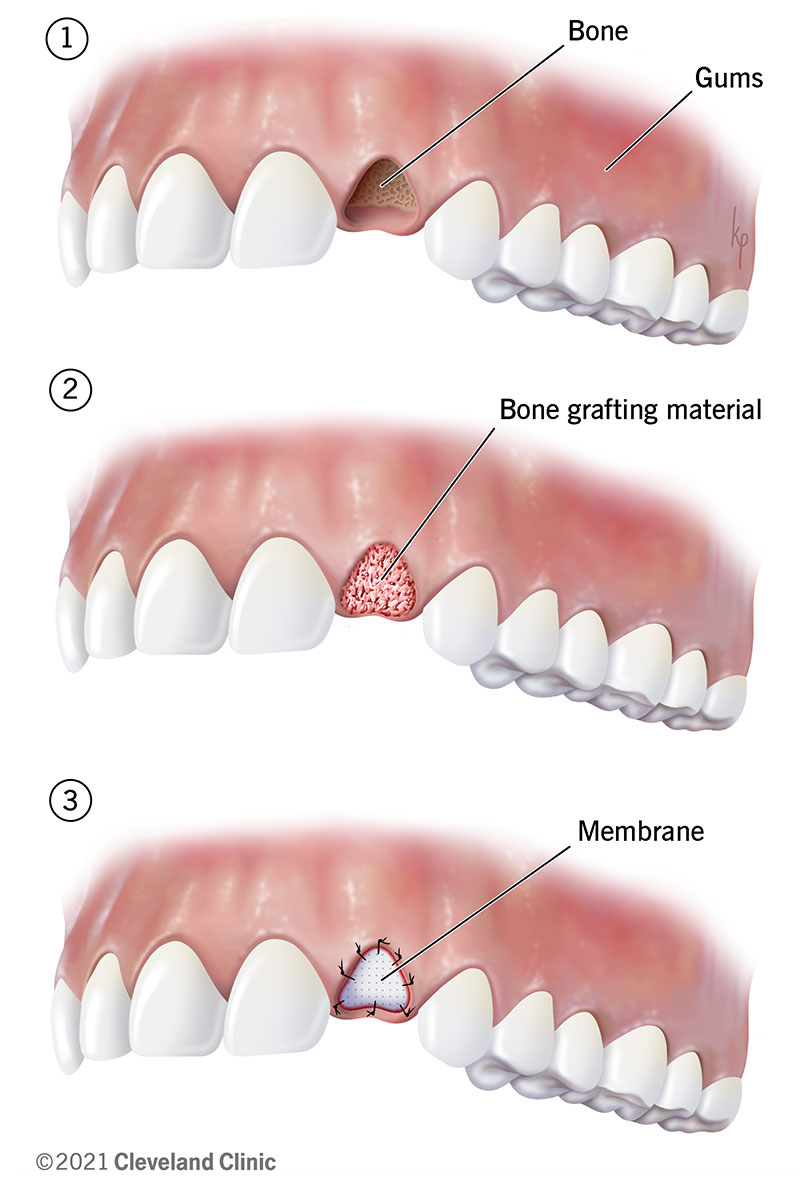A dental bone graft replaces missing or lost bone in your jaw. Healthcare providers commonly place bone grafts prior to dental implant surgery or when bone loss negatively affects your oral health. Initial healing takes about a week. But it can take up to one year for the bone graft to fully heal.
Advertisement
Cleveland Clinic is a non-profit academic medical center. Advertising on our site helps support our mission. We do not endorse non-Cleveland Clinic products or services. Policy

Image content: This image is available to view online.
View image online (https://my.clevelandclinic.org/-/scassets/Images/org/health/articles/21727-Dental-Bone-Graph-Illustration)
A dental bone graft is a type of oral surgery that increases the volume and density of your jaw. A healthcare provider adds powdered bone grafting material (natural or lab-made) to areas where you have lost or thinning bone.
Advertisement
Cleveland Clinic is a non-profit academic medical center. Advertising on our site helps support our mission. We do not endorse non-Cleveland Clinic products or services. Policy
Dental bone grafting holds space in your jaw so your own body can do the repair work. It’s like a scaffold on which your own bone tissue can grow and regenerate.
Types of dental bone grafting material include:
Dental bone grafting can:
Dental bone grafts are very common. Dentists and specialists (like oral surgeons or periodontists) do these procedures routinely. Providers currently place about 2.2 million bone grafts every year, globally.
Advertisement
Exact steps vary depending on where you need the bone graft. The following is a general outline of what you can expect during your procedure.
During dental bone grafting, your provider will:
In some cases, your provider might add platelet-rich plasma (PRP) to your dental bone graft. Your provider gets the PRP from a sample of your own blood and uses it to promote healing and tissue regeneration.
Dental bone grafting is a relatively minor procedure. Most people who have dental bone grafts report little to no pain. Just be sure you take all medications as prescribed and follow your post-op instructions closely.
Dental bone grafts can increase your eligibility for dental implants and other restorative treatments. This procedure restores your jaw to its original form following trauma, tooth loss or gum disease.
Dental bone grafts have success rates up to 100%, depending on the type. However, as with any procedure, failure is a possibility — especially among people who smoke or have certain medical conditions. Signs of dental bone graft failure include:
Bone grafting for teeth is generally safe. But, like any surgery, the procedure carries some risks, including:
It depends on the size of the bone graft. Initial recovery takes about a week, but the bone graft itself needs at least three months to heal. If you need a large bone graft, it may take nine to 12 months to heal.
After dental bone grafting, normal side effects include tenderness, swelling and bruising. These should go away within a week or two. In the meantime, you can manage any discomfort with over-the-counter (OTC) pain relievers. Your provider might also prescribe antibiotics to reduce your risk of post-op infection.
Advertisement
You might lose small bone fragments from the surgical site over the first few days. These fragments look like grains of sand or salt. This is normal during dental bone graft recovery and usually isn’t a cause for concern. But if you lose a large amount of bone fragments, let your healthcare provider know.
Your provider will give you post-op instructions specific to your case. Below are some general guidelines for what to do (and what not to do) after getting a dental bone graft.
Do:
Don’t:
A dental bone graft can last a lifetime. But if you don’t use it, you lose it. Here’s an example: If your provider places a bone graft in preparation for an implant later, there’s a time limit on how long you can wait in between. Once your bone graft heals, it’s best to get your dental implant within six to 12 months. Otherwise, your new bone graft will start to shrink and lose density.
Advertisement
Call your provider if you have a dental bone graft and develop:
Jawbone loss is detrimental to your oral health and can cause a domino effect of problems, including mobility and tooth loss. Dental bone grafts help improve your candidacy for dental implants and other restorative procedures. If you think you have jawbone deterioration, dental surgery can restore your oral health, function and overall quality of life.
Advertisement

Sign up for our Health Essentials emails for expert guidance on nutrition, fitness, sleep, skin care and more.
Learn more about the Health Library and our editorial process.
Cleveland Clinic’s health articles are based on evidence-backed information and review by medical professionals to ensure accuracy, reliability and up-to-date clinical standards.
Cleveland Clinic’s health articles are based on evidence-backed information and review by medical professionals to ensure accuracy, reliability and up-to-date clinical standards.
Dentistry plays an important role in oral health. Cleveland Clinic’s experts can design a personalized plan that will keep you smiling for the long haul.
